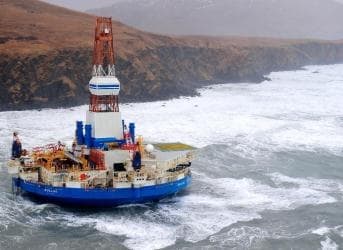U.S.-based supermajor Shell (NYSE:RDS.A) said it was making progress with the tow and recovery of the drill ship Kulluk, which struck ground last week off the coast of Alaska. The company said it was within miles of towing the vessel to a port where it will be inspected and evaluated. Kulluk was en route to Seattle in late December when it broke free in rough seas, raising concerns about drilling operations in arctic waters. A group of Democratic lawmakers said they wanted a detailed investigation into the incident given Shell's record in offshore Alaska. Despite alarm bells over the safety of frontier developments in arctic waters, however, the industry shows no signs of abatement.
Shell said drill ship Kulluk is likely to reach its destination offshore Alaska by the end of the day Monday or early Tuesday. Salvage crews and responders on board the vessel maintain there's no residual oil leaking from the drill ship, which is said to be in stable condition after running aground last week. Shell's 301-foot ice class oil recovery vessel Nanuq is shadowing the tow of the drill ship.
Related Article: Shell's Alaska Rig Debacle - Tip of the Iceberg?
Shell last year received approval from the U.S. government to begin exploration activity in the arctic waters of the Chukchi and Beaufort Seas. A series of equipment and weather issues, however, plagued the company's campaign to the delight of environmental groups concerned about the pristine arctic ecosystem. Members of the U.S. House Sustainable Energy and Environment Coalition, for their part, called on the Department of Interior and U.S. Coast Guard to conduct an investigation into the Kulluk incident.
"The recent grounding of Shell’s Kulluk oil rig amplifies the risks of drilling in the arctic," SEEC members said in a statement.
The incident, however, did little to sway the industry or interested governments from moving ahead with plans for further arctic exploration. Last week, the National Energy Authority of Iceland doled out its first exploration and production licenses for the Dreki area, a frontier area said to contain hydrocarbons offshore. The Icelandic government said exploration of its continental shelf is in the "early phase," though there is "a considerable amount of geophysical data" to support a preliminary campaign for a country whose economy was shattered for the 2008 financial crisis.
Related Article: Will Washington Now Hold Shell's "Feet to the Fire?"
Meanwhile, Exxon Mobil (NYSE:XOM) said it planned to develop the Hebron oil field off the eastern Canadian coast using a structure that could recover more than 700 million barrels of oil from the region.
"Exxon Mobil will employ its expertise in arctic development and project execution to develop this world-class resource in challenging operating conditions," said Neil Duffin, president of Exxon's development company, in a statement.
Melting sea ice brought on by warming trends has exposed vast unexplored areas of oil and natural gas. Environmental groups like Greenpeace have said energy majors like Shell "can't be trusted" in the arctic. A push toward renewable energy and a sluggish global economy is keeping oil demand modest and forecasts for 2013 are far from upbeat, the International Energy Agency said. But with the U.S. and Chinese showing signs of life, more barrels will be needed to keep the economic engines moving. With reserves like those in the North Sea becoming harder to reach, developments in the arctic should move beyond the frontier phase in the years to come despite early complications.
By. Daniel J. Graeber of Oilprice.com


















